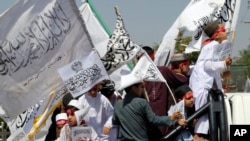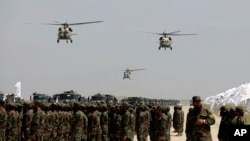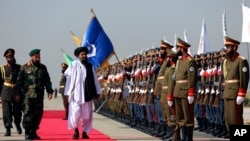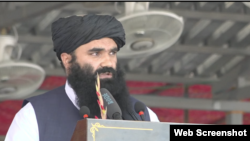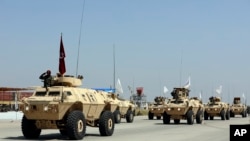The Islamist Taliban marked the third anniversary Wednesday of recapturing power in Afghanistan with a public holiday and a televised military parade at the former U.S.-run Bagram airbase, among other symbolic events.
The so-called “victory day” celebrations occurred amid ongoing global criticism of the Taliban government, known as the Islamic Emirate, for allegedly creating “the world’s most serious women’s rights crisis” and making impoverished Afghanistan the only country where girls are banned from education beyond sixth grade.
The ceremony at Bagram, around 40 kilometers north of the Afghan capital, Kabul, featured a 21-gun salute and speeches from top Taliban leaders, with thousands of people in the male-only audience, including foreign diplomats.
The then-insurgent Taliban swept back to power on August 15, 2021, as the U.S.-led international forces withdrew from the country after their involvement in the Afghan war for almost 20 years.
The Taliban’s prime minister, Hassan Akhund, stated in a message read by his chief of staff, "Allah granted the Mujahid nation of Afghanistan a decisive victory on this date over an international arrogant and occupying force." Akhund, largely considered a figurehead, was absent from Wednesday’s event.
Akhund’s message said that the Taliban government “has the responsibility to maintain Islamic rule, protect property, people’s lives, and the honor of our nation.”
The de facto Taliban government, not formally recognized by any country, cited the national solar calendar for marking the anniversary of “Afghanistan’s victory and freedom” from the U.S.-led “occupation” a day early.
Interior Minister Sirajuddin Haqqani, wanted by the United States for terrorism with a $10 million bounty for his arrest, also addressed the Bagram event, urging global cooperation and engagement with the Taliban administration.
"My message to the international community is that there is no need for dismay over the fact that you took our independence, and we reclaimed it successfully,” Haqqani said, without naming any country.
“We do not want to hold anyone accountable. We have created favorable circumstances and have good intentions for them to cooperate with us in rebuilding Afghanistan, similar to how they helped during the occupation,” he said.
Haqqani ran his network of militants, staging high-profile suicide bombings and other deadly attacks in support of Taliban insurgents on American and NATO forces during their presence in the war-torn South Asian nation.
The Bagram parade was also an opportunity for the Taliban to showcase the military hardware, including tanks, helicopters, and Humvees, left behind by U.S. and NATO forces.
Taliban leaders boasted about their conquest and subsequent achievements, such as establishing “peace and security” and an Islamic system in line with their harsh interpretation of Islam, but none of them responded to allegations of human rights abuses, particularly their sweeping curbs on women’s rights. They did not discuss hardships facing millions of Afghans.
The United Nations and international aid agencies have ranked Afghanistan as one of the world’s "largest and most complex” humanitarian crises. They estimated that 23.7 million Afghans, more than half women and children, need humanitarian relief.
A group of 29 U.N. experts Wednesday jointly called for “stronger and more effective” international action to address the deteriorating human rights situation in Afghanistan.
“We stress that there should be no move to normalize the de facto authorities unless and until there are demonstrated, measurable, and independently verified improvements against human rights benchmarks, particularly for women and girls,” the Geneva-based experts said in a statement.
In a separate joint statement this week, international non-governmental organizations warned of a growing aid funding gap.
Speaking ahead of the three-year anniversary of the Taliban takeover, a top U.N. official on Tuesday urged the world to support Afghan women’s fight for freedom.
“Three years’ worth of countless decrees, directives, and statements targeting women and girls – stripping them of their fundamental rights, eviscerating their autonomy,” Alison Davidian, the U.N. Women's country representative in Afghanistan, said while sharing details of the latest survey.
She referred to religious edicts the reclusive Taliban supreme leader, Hibatullah Akhundzada, has issued over the past three years to govern the crisis-hit country, most of them leading to restrictions on the freedom of Afghan women and girls. Akhundzada rarely leaves the southern city of Kandahar, regarded as the country’s de facto capital.
“To date, no woman in Afghanistan is in a leadership position anywhere that has influence politically at the national or provincial level. When Afghan women are engaged in the Taliban’s structures, their roles are largely about monitoring the compliance of other women with their discriminatory decrees,” Davidian told reporters in New York.
“We must continue to invest in women. Nothing undermines the Taliban’s vision for society more than empowering the very part of the population they seek to oppress,” she stressed.
Human Rights Watch reiterated its call for the global community to press the Taliban to remove curbs on women.
"The third anniversary of the Taliban's takeover is a grim reminder of Afghanistan’s human rights crisis, but it should also be a call for action,” said Fereshta Abbasi, the U.S.-based watchdog’s Afghanistan researcher.
The Taliban have dismissed criticism of their government as interference in internal matters of Afghanistan, saying their policies are aligned with local culture and Islam.
Terrorism-related international sanctions on many top Taliban leaders, isolation of their administration, and continued suspension of foreign development aid have made it difficult for Kabul to address deepening economic troubles.
The World Bank reported in April that the aftermath of the Taliban takeover had seen a stark decline in international aid, leaving Afghanistan without any internal growth engines and leading to "a staggering 26 percent contraction in real GDP.”




